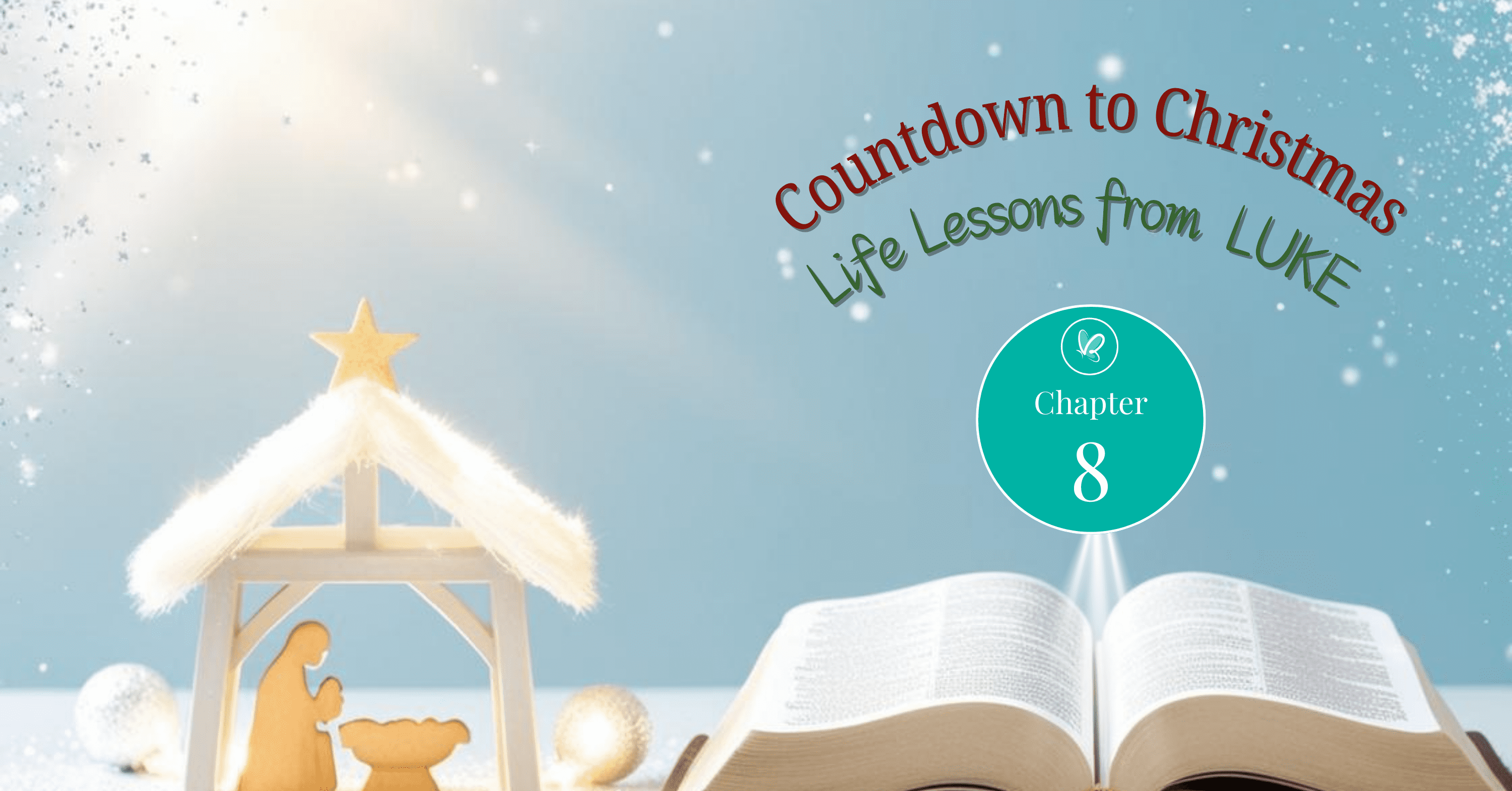Hearing, Believing, and Receiving!
There are 56 verses in this chapter, and we are taught many powerful principles through the Parables Jesus taught. This chapter includes:
- Many women minister to Jesus
- The Parable of the Sower
- The Purpose of Parables
- The Parable of the Sower Explained
- The Parable of the Revealed Light
- Jesus’ Mother and Brothers Come to Him
- Wind and Waves Obey Jesus
- A Demon-Possessed Man Healed
- A Girl Restored to Life and a Woman Healed
Encouraging Verse: Luke 8:15
AMPC: “But as for that [seed] in the good soil, these are [the people] who, hearing the Word, hold it fast in a just (noble, virtuous) and worthy heart, and steadily bring forth fruit with patience.”
NIV: “But the seed on good soil stands for those with a noble and good heart, who hear the word, retain it, and by persevering produce a crop.”

The Context
As He often did, Jesus taught in parables. What is a parable? The word comes from the Greek parabolē, which combines two words that literally mean “to throw alongside.” This refers to placing a familiar concept next to a spiritual truth to make it understandable. It can also describe the figurative language used to communicate a hidden truth.
Jesus used many parables. There’s an extensive list at the end of this blog if you want to do some further research! 🙂
The chapter begins by saying that Jesus and His disciples continued their travels through cities and villages, sharing the good news of the Kingdom of God. By the way, the Bible makes sure to mention that women traveled along on these journeys, including Mary Magdalene, Joanna, and Susanna. Ladies, we have roles to play in the Kingdom!
As usual, a large multitude from many cities gathered around, and Jesus began His discourse by telling them the Parable of the Sower (verses 4-8). But even His disciples didn’t understand what it meant. He said, “To you it has been given to know the mysteries of the kingdom of God, but to the rest, it is given in parables, that ‘Seeing they may not see, and hearing they may not understand.’” I like how The Message puts it: “But even with stories, some of them aren’t going to get it: Their eyes are open but don’t see a thing, their ears are open but don’t hear a thing.” Jesus was quoting Isaiah 6:9.
Because this mystery needed to be revealed to His chosen, He started to explain this powerful parable.
This is the context of Luke 8:15, which is why I’ve chosen this verse for today. 😊
My Thoughts
I once heard it said that if you don’t understand this particular parable, you will hardly understand any of them. I’m not sure why, but it clearly is very important for our understanding as students of the Kingdom of Jesus. This parable is mentioned in the other two synoptic gospels, Matthew and Mark, with just subtle nuances in their recollections. For instance, Matthew emphasizes that the rewards would be varied, so not everyone receives the hundredfold return, but some 30 and some 60 (Matthew 13:23). He also explained that the disciples would receive the interpretation because, “For whoever has, to him more shall be given, and he will have an abundance; but whoever does not have, even what he has shall be taken away from him.”
We are told in Luke 8:11 that the seed in the parables represents the Word of God. In verse 15, Jesus explains the fourth scenario: the seed that falls on good ground is the one that reaps up to a hundredfold harvest! I think we all raise our hands for this one. Thirty and sixty-fold returns are good, but I’m sure we all want to see and receive the maximum return!
Before we talk about the ground, let’s talk about the seed we want to sow. We know that the Word of God is living and active, and we recall in Luke 1 that no word of God is impossible of fulfillment! So where are we getting these words from? The seed is ANY word that comes from God, so it can be:
- Logos: The Written Word of God—the Bible is foundational and universal, representing God’s complete and written word, from Genesis to Revelation. Whatever Word you can apply from these 66 books is a good seed.
- Rhema: The Spoken Word given by the Holy Spirit. It’s personalized and usually has an immediate or soon-coming application. These can be scriptures that seem to jump off the pages, and you know, that you know, God is speaking directly to you and your circumstance.
- Prophetic Word: From God through the Holy Spirit through a prophet of God—either someone called to the Office of a Prophet, or someone with prophetic grace, who can give divine insight into future events, or God’s specific intentions for you.
Once you are sure the Word has God as its ultimate source, it is good seed! A word of caution: a true prophetic word will NEVER contradict the Bible. Never. God cannot contradict Himself.
Now, let’s talk about the good ground. The ground refers to our hearts and souls—where we feel emotions, make choices and decisions. So w before anything can materialize, the seed is processed in your heart. Jesus tells us that the ‘good’ ground refers to those with a noble, good, and virtuous heart. The word ‘good’ here can be interpreted as goodness that is intrinsic, genuine, admirable, and tied to moral integrity or virtuous qualities.
This parable points then to a powerful3-step promise:
- We take the Word(s) and hide it in a good heart.
- We keep it and preserve it (waiting patiently).
- We bear 30, 60, or 100-fold!
As The Message Bible says, we stick with it until we receive the harvest!
Practical Application
*If it is a Logos or Rhema Word that you are taking before the Lord, make sure you are entitled to reap its benefits. HOW? Ensure that if it is conditional, you have done your part of the deal, and also that you have co-labored with the Holy Spirit.
*If it’s a Prophetic Word, test the spirit giving you the word, as instructed in 1 John 4:1: “Dear friends, do not believe every spirit, but test the spirits to see whether they are from God, because many false prophets have gone out into the world.”
Also, remember the Bible says we shall know them by their fruit. Test the prophet’s fruit!
*Make sure your heart is on good ground. Do frequent heart checks and stay in a posture of repentance before the Lord. Live a clean and righteous life. Be holy (set apart) as He is holy. Therefore:
- Make sure that you have some soil and depth in the Kingdom, so things are not ‘surface level’, and the enemy can’t come and snatch your word.
- Ensure that you have spiritual depth! Your roots must be firmly planted in Christ so that when temptation comes, you are not drawn away.
- Make sure that you are not drawn away by the things of the world—whether the “sweets” (the deceitfulness of riches) or the “stress” (the concerns of the world).
*Hang on to the Word. Keep it! Paul told Timothy to wage war with the prophecy (1 Timothy 1:18). Trust me, there will come a day when you’ll need to fight with your prophecy as a weapon.
*Persevere!
I don’t think anyone likes this part. We all want to get the Word and see it manifest by nightfall. Wouldn’t that be great? But there is planting and root-growing time. Often the words and we (the recipient) have to be tested (Psalm 105:19). We have to be like Abraham, who through faith and patience inherited the promises.
*Reap your Harvest!
Give thanks to God! Rejoice and celebrate! Share your blessings with others!
Your Turn 😊
– What are your thoughts on Luke 8:15?
– How can you apply this passage to your life?
– Do you have a favorite verse or take away from this chapter?
Please share your insights—I’d love to hear from you!
Until tomorrow – Peace & Love,
Coach D
Jesus’ Stories and Parables:
- The Parable of the Sower (Matthew 13:1–23; Mark 4:1–20; Luke 8:4–15)
- The Parable of the Weeds (Matthew 13:24–30)
- The Parable of the Mustard Seed (Matthew 13:31–32; Mark 4:30–32; Luke 13:18–19)
- The Parable of the Leaven (Matthew 13:33; Luke 13:20–21)
- The Parable of the Hidden Treasure (Matthew 13:44)
- The Parable of the Pearl of Great Price (Matthew 13:45–46)
- The Parable of the Net (Matthew 13:47–50)
- The Parable of the Lost Sheep (Matthew 18:10–14; Luke 15:3–7)
- The Parable of the Unmerciful Servant (Matthew 18:23–35)
- The Parable of the Workers in the Vineyard (Matthew 20:1–16)
- The Parable of the Two Sons (Matthew 21:28–32)
- The Parable of the Tenants (Matthew 21:33–46; Mark 12:1–12; Luke 20:9–19)
- The Parable of the Wedding Banquet (Matthew 22:1–14)
- The Parable of the Fig Tree (Matthew 24:32–35; Mark 13:28–31; Luke 21:29–33)
- The Parable of the Ten Virgins (Matthew 25:1–13)
- The Parable of the Talents (Matthew 25:14–30)
- The Parable of the Good Samaritan (Luke 10:25–37)
- The Parable of the Rich Fool (Luke 12:13–21)
- The Parable of the Barren Fig Tree (Luke 13:6–9)
- The Parable of the Great Banquet (Luke 14:15–24)
- The Parable of the Lost Coin (Luke 15:8–10)
- The Parable of the Prodigal Son (Luke 15:11–32)
- The Parable of the Dishonest Manager (Luke 16:1–13)
- The Parable of the Rich Man and Lazarus (Luke 16:19–31)
- The Parable of the Persistent Widow (Luke 18:1–8)
- The Parable of the Pharisee and the Tax Collector (Luke 18:9–14)


Leave a Reply